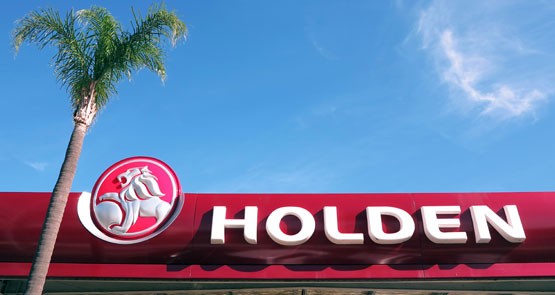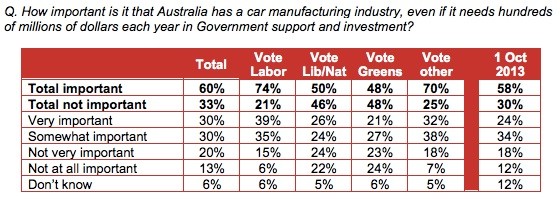
Voters support assistance for Qantas and Toyota but appear resigned to seeing Holden wind up and don’t blame the government for it, new polling from Essential Research finds.
Essential found 45% of voters support greater subsidies to keep General Motors operating Holden in Australia, but 42% opposed them. That’s despite 60% of voters believing it’s important that Australia has a car manufacturing industry.

And the strongest opponents of industry assistance aren’t Liberal voters but Greens voters, who are evenly split on the importance of the car industry. Only 30% of Greens voters back more handouts for Holden, compared to 59% who opposed them; Liberal voters split 35%-57% on more subsidies. Labor voters, in contrast, were 60% in favour of more handouts. The position of Greens voters on industry assistance once again appears different to their party’s policy, which is strongly protectionist.
When it comes to Toyota, the last remaining car manufacturer, 44% of voters believe assistance should be left where it currently is, but 31% believe it should be increased, including 44% of Labor voters. Greens voters, again, are the most economically rationalist, with only 16% supporting more assistance for Toyota.
On Qantas, 20% of voters wanted the government to allow increased foreign ownership of the airline, the same number as thought it should be provided with direct subsidies. More popular was the idea of nationalising the airline — 26% of voters wanted the government to buy it fully, while 24% thought the government should at least buy shares in it. Doing nothing at all was favoured by only 13%. Labor voters were a little more supportive of buying equity in the airline, while Coalition voters preferred enabling greater foreign investment. Greens voters were again the most opposed to any sort of assistance, whether via equity or direct assistance, but were also opposed to increasing foreign ownership; nearly a quarter of Greens voters preferred doing nothing about the airline’s woes.
Neither issue appears to have hurt the government: on voting intention there’s little change from last week. The Coalition remains on 44% and Labor remains on 37%. The Greens have dropped a point to 7%; the Palmer Party is down a point to 4% and Others are on 8%. The 2PP outcome remains on 51%-49%.
The election outcome doesn’t appear to have improved the mood of voters about politics, with 70% of voters saying it had been a bad year for politics generally; they also thought it had been a bad year for small business, the Australian economy and “the average Australian”. But economically they are in a better frame of mind: 39% said it had been a good year for themselves and their family overall, compared to 21% who thought it had been a bad year. Only 21% believe next year will be a better year in politics, with 45% believing it will be a bad year; but 27% believe it will be a good year for the Australian economy, compared to 37% who think it will be bad; 31% believe it will be good for their financial situation, compared to 25% who think it will be bad. Overall, 41% thought next year would be good for voters and their families.
*Tomorrow: Essential Research’s biannual “trust in media” results








Dear Bernard,
May I suggest you stop quoting Essentials Polling results.
As of today the 17 Dec. 2013 Essential has the 2 party preferred federal poll as 49% for Labor and 51% for LNP.
Newspoll, Morgan Poll, ReachTel, and the Nielsen Poll all have Labor at 52% and LNP at 48%.
This indicates to me that Essential is off the mark and needs to lift it’s game.
Regards,
Paul
Agree with Paul. Where I come from (SA), every man and his dog thinks the feds should have supported Holden with real money, and they absolutely blame Abbott and his motley crew for Holden pulling out of Australia. I’ll take a bet, it’s not any different in Victoria.
Bernard – your report doesn’t make sense. In the second paragraph it says that more people (45%) supported subsidies to Holden than did not (42%). And 60% said we should have a car industry in Oz. How can you say that most people are resigned to their fate when the numbers don’t support your point of view? That is just crazy stuff!
And who cares what the (mostly) tertiary educated Green supporters/voters think? Most of them need to do an honest days work and get their hands dirty for a change.
Elitist bull*hit!
The unions have stuffed Holdenwoo, and GM vultures are picking the bones. There’s no value in pouring more money into it, for the first time MrRabbott has made a sensible decision, but the future is grim for the rest of the industry.
Last time I looked, the company in question was called GM Holden. The trouble with propping-up this company, even with checks and balances, is that the money WILL simply be siphoned off to Detroit. Australia needs a manufacturing sector based around sustainable transport however, the current government has, as always, no ideas.